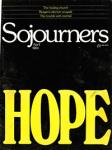When Ntozake Shange published For Colored Girls Who Have Considered Suicide When the Rainbow is Enuf, I was delighted. I read the book six times, and I saw the play three times. This work meant so much to me then and continues to mean a great deal to me primarily because I am a "colored girl" who has considered suicide often and who struggles to find how the "rainbow is enuf."
Thanks be to God that he speaks to me in the ways that I can hear best. God used Shange to help me name the pain that I felt and also to show me that he was present to me, and more importantly that he had always been present to me, even before the time of my birth. Like the women in For Colored Girls, I knew of no one who would "sing a black girl's song" and make clear, affirmative statements about my worth as a human being upon the planet.
While this continues to be true, it was a much more destructive fact for me in the past than it is now. I had a great deal of difficulty living as a black female follower of Jesus in a world that deemed me alien first on the basis of my blackness, then my femaleness, and finally because of my faith. As a result my life has often been and is now at times plagued by depression and despair.
So why is a person who admits to being suicidal writing about hope? Because the fact that I am 37 years old and able to articulate why I am alive speaks to where I find hope.
I am not really sure about what it means to love God, but I do know what it means to be loved by God; and while God's love for me is no guarantee against struggles, despair, or suicidal thoughts, it gives me the strength to take the next step.
Psalm 139 has become one of my favorite statements about God's love for me and presence in my life. The psalmist proclaims, "Surely the darkness will hide me and the light become night around me; even the darkness will not be dark to you, the night will shine like the day, for darkness is as light to you" (Psalm 139:11-12). I am reminded by this proclamation that God is the ultimate reconciler of the contradictions of life. For even in the darkness God stands at the center and becomes as the light.
Because I am alive today I know that God has stood at the center of my despair and darkness and that out of that presence my will to continue was born. I am aware that I must simply be present to the power and love that have kept me from suicide, and that at the very core of my deepest despair or hottest rage stands God. I will be "held fast by his right hand" because there is no place that I can go either inwardly or outwardly where God is not already present.
My hope is further undergirded by the knowledge that the contradictions of life in general and my life in particular are never final. All of the sum of my loves, hates, joys, sorrows, failures, successes, fears, and hopes must rest finally with God, who alone knows their real meaning and their significance for his plan for my life.
So I sing with my slave mothers and fathers, "Sometimes I am up, sometimes I am down and sometimes I am almost to the ground," but it doesn't really matter because God is there wherever I am. And life continues.
Catherine Meeks, author of I Want Somebody to Know My Name and a Sojourners contributing editor, was a doctoral student in Jungian psychology and African culture, and director of Afro-American studies at Mercer University when this article appeared..

Got something to say about what you're reading? We value your feedback!
